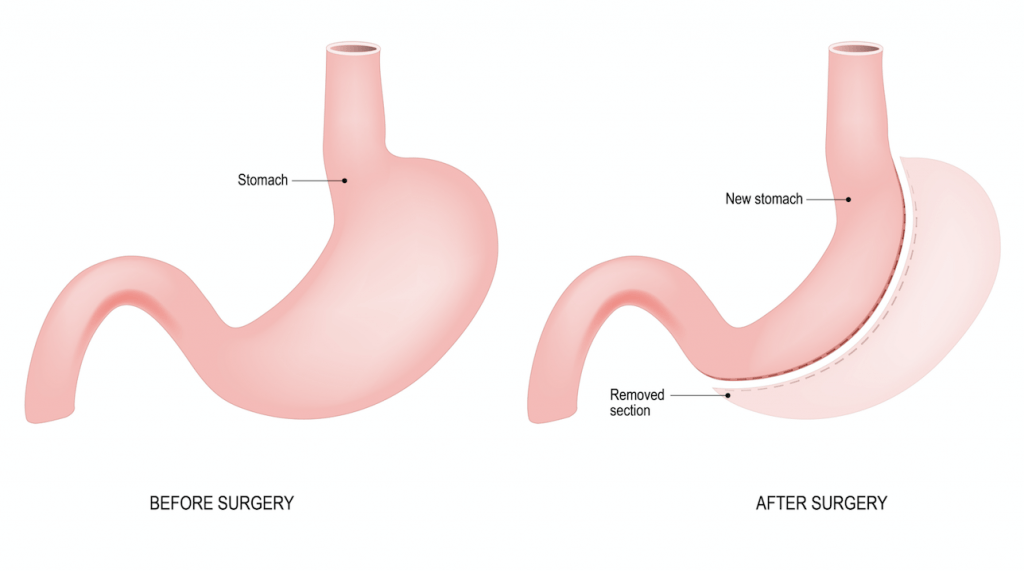Why would I have a Gastric sleeve?
Gastric sleeve is a type of bariatric surgery (weight-loss procedure) to surgically remove a large part of the stomach and reduce its size by up to 85%. The remaining portion of the stomach looks like a banana or a sleeve. By reducing the size of the stomach, you will get fuller faster. As a result, rapid weight loss can be achieved. Doctors usually recommend the procedure to people who:
- Have a body mass index (BMI) of 40 or more
- Have a BMI of 35 to 40, but also have obesity-related medical conditions such as heart disease, high cholesterol, type 2 diabetes, or severe sleep apnea
- Have tried and failed to lose weight by diet and exercise
- Can commit to a healthy lifestyle following the procedure.

What are the benefits of having a gastric sleeve?
One of the main benefits of gastric sleeve surgery is helping you lose weight by suppressing your appetite. However, weight loss is only one of the benefits. Other benefits of gastric sleeve surgery are as follows.
- Long-term remission for type 2 diabetes
- Eliminate obstructive sleep apnea
- Improve fertility
- Alleviate joint pain
- Help with depression
- Improve cardiovascular health
- Relieve other health conditions.
What is the recovery time?
You will likely experience a sore and swollen stomach for several days, but your doctor will prescribe medications to help with the pain. Within 2 to 4 weeks following the surgery, you may be able to return to some of your activities, including work if your job is not physically demanding. It may take around 6 weeks until you can return to your complete normal routine.
How long will I need to stay in the hospital after my procedure?
You will need to stay in the hospital for 2 to 3 days. You will be under close monitoring and will be discharged when your condition is stable.
How long should I expect to stay overseas after my procedure?
Aim to stay overseas for at least 8 days for follow-up check-ups, where you are kept under review to make sure everything is alright. The stitches are removed within 5 to 7 days following the surgery.
What aftercare should I take into consideration?
Following surgery, you need to start consuming soft foods and progress to eating more solid foods over time. Your doctor will give you suggestions for foods to eat during each phase. You may need to take liquids for the first two days and then pureed food for at least 4 weeks. Your doctor may give you a list of food you have to avoid. You will be required to take multivitamins and minerals daily for the rest of your life, particularly vitamin B12. Besides adjusting your diet, it is also important for you to adjust the way you eat, such as consuming four to six smaller meals instead of three large ones and eating slowly. In addition, you have to exercise regularly. Your doctor may talk about the recommended exercise routine. You will also have to attend routine follow-up check-ups in which your weight loss is recorded.
What’s the success rate like?
A gastric sleeve is a safe and effective procedure. You can expect to lose about 60% of your excess weight after 12 to 18 months after surgery. Although the procedure is very safe, make sure you are well-informed of the side effects and risks. These include bleeding, infection, a leak along the staple line, nausea, vomiting, and constipation.

Will I lose hair after a gastric sleeve?
Hair loss after gastric sleeve is common between 3 and 6 months after surgery. However, they’re mostly temporary. Make sure to have adequate protein, vitamins, biotin, and minerals to help regrow your hair and avoid long term thinning.
Are there alternatives?
The most popular alternative is a gastric bypass. However, if you prefer minimally invasive and reversible alternatives, you can consider a gastric band and gastric balloon. With a gastric band, a silicone device is placed at the top portion of the stomach to reduce its size. With a gastric balloon, an inflatable balloon-like device is placed into the stomach to reduce its capacity.

